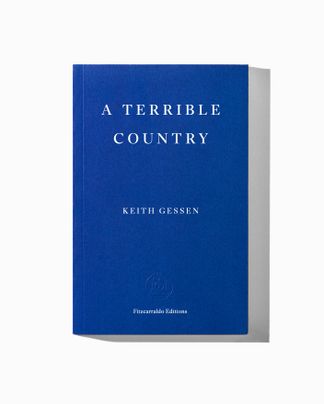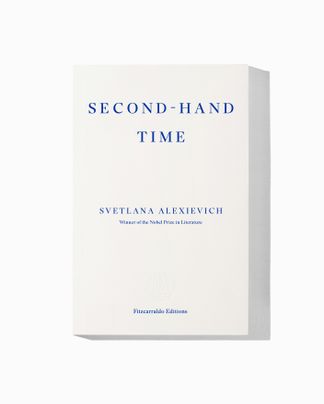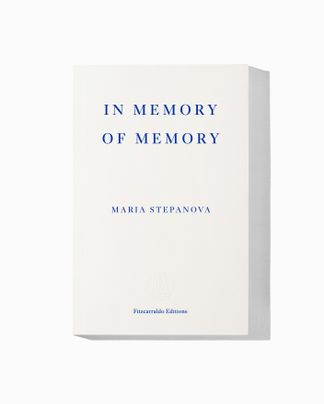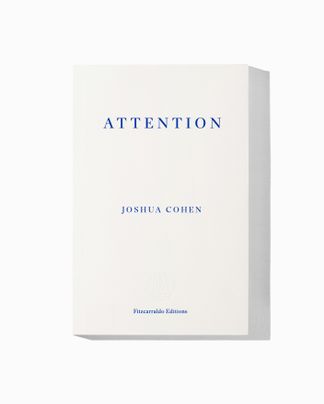Before retiring from the literary world and relinquishing all copyright to his work in 2003, Kirill Medvedev had published two collections of poetry with a traditional publishing house. His poems are autobiographical free verse, unusual in Russia, and were dismissed by some critics as not really poetry. Medvedev’s poetry – casual, often explicitly political, irreverent – fiercely diagnose the banality and disease of Putin-era Russia. Edited and introduced by n+1 co-founder Keith Gessen, It’s No Good includes selected poems from Kirill Medvedev’s books of poetry and subsequent online publications, as well as his most significant essays: ‘My Fascism’ (on the failure of post-Soviet Russian liberalism, politically and culturally); ‘Literature Will Be Tested’ (on the attractions and dangers of the ‘new sincerity’ in Russian letters); ‘Dmitry Kuzmin: An Essay-Memoir’ (a detailed memoir and analysis of the work of the 1990s Moscow poet, publisher, and impresario Kuzmin, and what his activity represents). As always, they are published without the author’s permission.
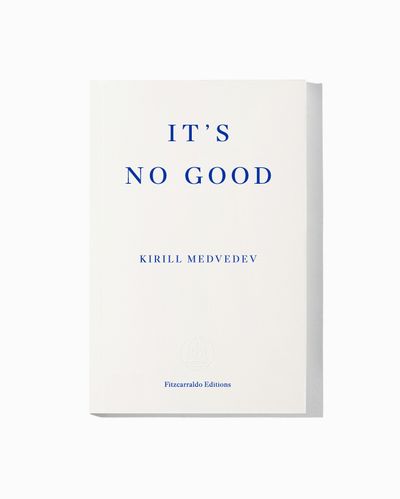
It’s No Good
Edited and introduced by Keith Gessen
Published 3 June 2015, French paperback with flaps, 278 pages
Translated by Keith Gessen, with Mark Krotov, Cory Merrill and Bela Shayevich
It’s No Good
Edited and introduced by Keith Gessen
KIRILL MEDVEDEV: AN INTRODUCTION
I first learned of Kirill Medvedev in Fall 2006, when someone handed me a copy of the literary magazine Kriticheskaya Massa (“Critical Mass,” now defunct), featuring a symposium about the release of Medvedev’s book by the Novoe Literaturnoe Obozrenie (NLO) publishing house. The book’s release required a symposium because Medvedev had renounced all copyright to his works, and NLO had nonetheless gone ahead and published the book without asking his permission. They called it Texts Published Without the Permission of the Author. One essay defended the publication; another, “The Surrender and Death of a Post-Soviet Intellectual”—by the poet, editor, and impresario Dmitry Kuzmin—attacked the author. There was also an essay by Medvedev himself, reprinted (again without permission) from his website. The day after reading all this I found the book in question at the annual Moscow Book Fair. I read it on the subway ride home. It was a mixture of poems and essays and descriptions of Medvedev’s (often oneman) political actions. I couldn’t believe what I was reading. After failing to find another copy of the book at several stores, I finally located three at Falanster, off Tverskaya, and bought them all.
How to describe the political and cultural and just plain human stagnation of the years of mature Putinism, between about 2003 and 2008? “Fear” is not the right word. Moscow has always been a dangerous place, but it was no scarier in 2006 than it was in 1996—it was a lot less scary, in fact. Putin himself, ruler of Russia, was certainly a bad man. But he was not the bogeyman. The atmosphere was of boredom, suffocation, and surrender. Nothing happened. No one wanted anything to happen. “Stability” was the word of the day and in service of this stability people were willing to give up a great deal. The liberal opposition that still made appearances in the New York Times not only had no real presence in Russia—no party organization, no television stations, no support—they were also thoroughly discredited. They had taken power in the post-Soviet period on a wave of popular anger and hope and had disappointed those hopes; they had proved vain, callow, visibly indifferent to the sufferings of millions. (These people unfortunately included many urban intellectuals, formerly known as the intelligentsia. They hated the Soviet Union so much, were so happy to see it gone, that they refused to see how bad things were getting until it was too late.) By late 2003, after the arrest of the oligarch Mikhail Khodorkovsky signaled the final end of the hopes of the 1990s, political opposition to Putin came to consist on the one hand of a weird party of teenage outcasts, part Stalinist, part anarchist, led by a former poet turned revolutionary turned federal prisoner named Eduard Limonov (he served a two-year sentence beginning in 2001 for illegal purchase of firearms), and on the other of Chechen terrorists. Real power was wielded by a cabal of businessmen and politicians and businessmen-turned-politicians (and vice versa). Occasionally for prying into business transactions—but not for any political speech or position—a journalist would get shot.
All this, plus money. Russia is a huge exporter of oil, natural gas, nickel, and aluminum. Between 1998 and 2008, prices for these and other raw materials rose, in some instances, by an order of magnitude. The country was awash in cash. And so in addition to total political and cultural stagnation, a culture of “luxury” sprang up; people were buying luxury cars and suits and thousand-Euro leather jackets. In response, a great many people threw in the towel. It was almost impossible to participate in politics; the remaining cultural institutions were either irrelevant, cowed, or (in the case of the new glossy consumer magazines, like Russian Esquire) entirely geared toward the nascent bourgeoisie; it was better to get what you could while the getting was good.
This was the cultural, political, and social situation in the fall of 2006, when I found Medvedev’s book. The crusading journalist Anna Politkovskaya had just been shot in her elevator, and Putin had as much as spit on her grave a few days later. To the great indignation of the international press, he declared that no one in Russia cared about Politkovskaya—and he was right. She was shot and it didn’t matter. Perhaps it was time to pack it in for the next decade or so.
The author of Texts Published Without… was just 31 years old. He had published, through traditional channels, one book of poetry—Vsyo plokho (“Everything’s Bad,” or “It’s No Good”)—and another book, Vtorzhenie (“Incursion”), that was a mixture of poetry and essays. Both had been well-received by critics, although also denounced in some circles as self-indulgent, “not poetry,” and so on. The poems were free verse, which put them slightly outside the Russian poetic tradition; they were more reminiscent of Charles Bukowski (whom Medvedev had translated) than any Russian predecessor. But what put them really outside the Russian tradition was their everyday-ness. It was bad enough for a poet not to rhyme, but to discuss at length how he found some cheap pâté at an expensive supermarket—and not as a metaphor for anything, really: he was mostly pleased to have found some cheap pâté—was a little much, or too little. There had been a strain of anti-Romantic Russian poetry going back all the way to Pushkin; in the late Soviet period, especially, the great conceptualist poets, Dmitri Prigov chief among them, enjoyed puncturing the pretensions of highly rhetorical Soviet poetry with their versetales of going to the store to buy stale bread. (The Soviet conceptualist novel par excellence was Vladimir Sorokin’s The Queue (1984), the entirety of which took place in a line outside a store.) So it wasn’t as if Russian poetry had never not rhymed, and it wasn’t as if it had never been to the supermarket. The difference may have been that Medvedev, while doing away with much of the formal apparatus of Russian lyric poetry, had retained its messianic element. He was not an ironist; he was very much a Poet. In the end, as Medvedev says of his one-time friend turned antagonist Dmitry Kuzmin, the combination of all these things in one person proved really very aggravating.
Medvedev’s evolution as a poet and thinker leading up to his renunciation of copyright and rejection of the literary world was visible in his first two books. The poems in his first book, It’s No Good, were memoiristic and introspective, though that book, too, began with a rejection—of translation. The first poem of Medvedev’s first book declared that he would no longer translate other poets, but be himself a poet. The rest of the book expanded, confidently and sometimes exuberantly, on this discovery. In his second book, Incursion, doubt began to creep in: poems and essays responded to his critics, made further declarations, pleaded for more time. The book included a long essay on the terrorist attacks of September 11; a discussion of Medvedev’s translations of American pornographic novels; and some reflections on the different Russian words for cock and cunt. It concluded with a long diary about the author’s frustrations with money and publishing and writing that was framed as annotations to the published diary of the dean of the Gorky Literary Institute.
Then came the break with the literary world. Looking back on it, Medvedev has said that what troubled him most about the reception of his first two books was not the criticism of his poetry, nor, on the other hand, that some people really liked his poetry and were willing to publish more of it—but that, in the end, all of this was in some profound way irrelevant. Arguments about poetry never spilled over into real life. They did not change anyone’s behavior. They certainly (this was in 2002, 2003) did not affect anyone’s view of whether the United States should invade Iraq.
Medvedev began, by his own account, to read more deeply and widely, especially in leftist political philosophy. He concluded that he must change his life. On his website he announced that he would no longer participate in the literary scene in any of its manifestations: no publications, no readings, and in fact he no longer claimed any copyright to his work. Only pirated editions: no contracts. He began writing long essays, which he posted online, about the fate of the Russian intelligentsia. And eventually he took to the streets. In early 2007, a few months after I discovered his book and started giving it out to my friends, my sister, a journalist in Moscow, sent me a link to a Russian news story. “Is this your Medvedev?” she asked. The article described how Medvedev had set up a one-man picket in front of a fashionable theater in central Moscow because the director had signed a letter in support of Putin but was now staging a play by the anti-totalitarian poet and playwright Bertolt Brecht. One of the theater’s guards came out, infuriated, and punched Medvedev, who nonetheless continued his picket. That was my Medvedev, all right.
(…)
‘Russia’s first authentic post-Soviet writer.’
— Keith Gessen, co-founder of n+1
‘If you want sincere, sophisticated insights into life under Vladimir Putin’s government then read Medvedev. And if you feel adrift from the political direction of your own society then Medvedev’s ability to convert alienation into urgency is inspiring.’
— Max Liu, Independent
‘Archimedes famously said something like, Give me a place to stand, and a long enough lever, and I’ll move the world. Kirill Medvedev and his translators have given American readers another place to stand, a kind of Zuccotti of the mind.’
— Garth Risk Hallberg, The Millions
‘Finally, ideology instead of careerism and compromise!… It’s No Good does not give the sense of an artist emerging from politics, but rather the opposite.’
— Chris Cumming, BOMBlog
‘Part of the nightmare world that It’s No Good evokes is one that both Orwell and the members of Pussy Riot would understand. It’s a nightmare of euphemism and cant…. Medvedev is a big personality, on the page and off. He comes across as a shambling holy fool, an unkempt mix of Roberto Benigni and Gary Shteyngart.’
— Dwight Garner, New York Times
‘For a small-press collection of translated poems – a thrice stricken microgenre not used to making news – It’s No Good has received an impressively attentive reception in the United States.’
— Robert P. Baird, New Yorker
‘Kirill Medvedev is the most exciting phenomenon in Russian poetry at the beginning of the new century. To be fair, that’s not a compliment. It’s a judgment. You get the sense that Medvedev has no fear, and that this fearlessness costs him nothing. Such things are rarely forgiven.’
— Dmitry Vodennikov
Born in Moscow in 1975, Kirill Medvedev has recently emerged as one of the most exciting, unpredictable voices on the Russian literary scene. Widely published and acclaimed as a poet, he is also is an activist for labor and a member of the Russian Socialist movement Vpered [Forward]. He contributes essays regularly to Chto Delat, and other opposition magazines. His small press, The Free Marxist Press [SMI], has recently released his translations of Pasolini, Eagleton, and Goddard, as well as numerous books at the intersection of literature, art and politics, including a collection of his own essays. It’s No Good is Medvedev’s first book in English.
Keith Gessen was born in Moscow in 1975 and emigrated to the United States with his family in 1981. He is a founder of the literary magazine n+1 and the author of All the Sad Young Literary Men. From Russian he has translated Ludmilla Petrushevskaya and Svetlana Alexievich, and has written about Russian politics and culture for the New Yorker, the London Review of Books, and n+1.

